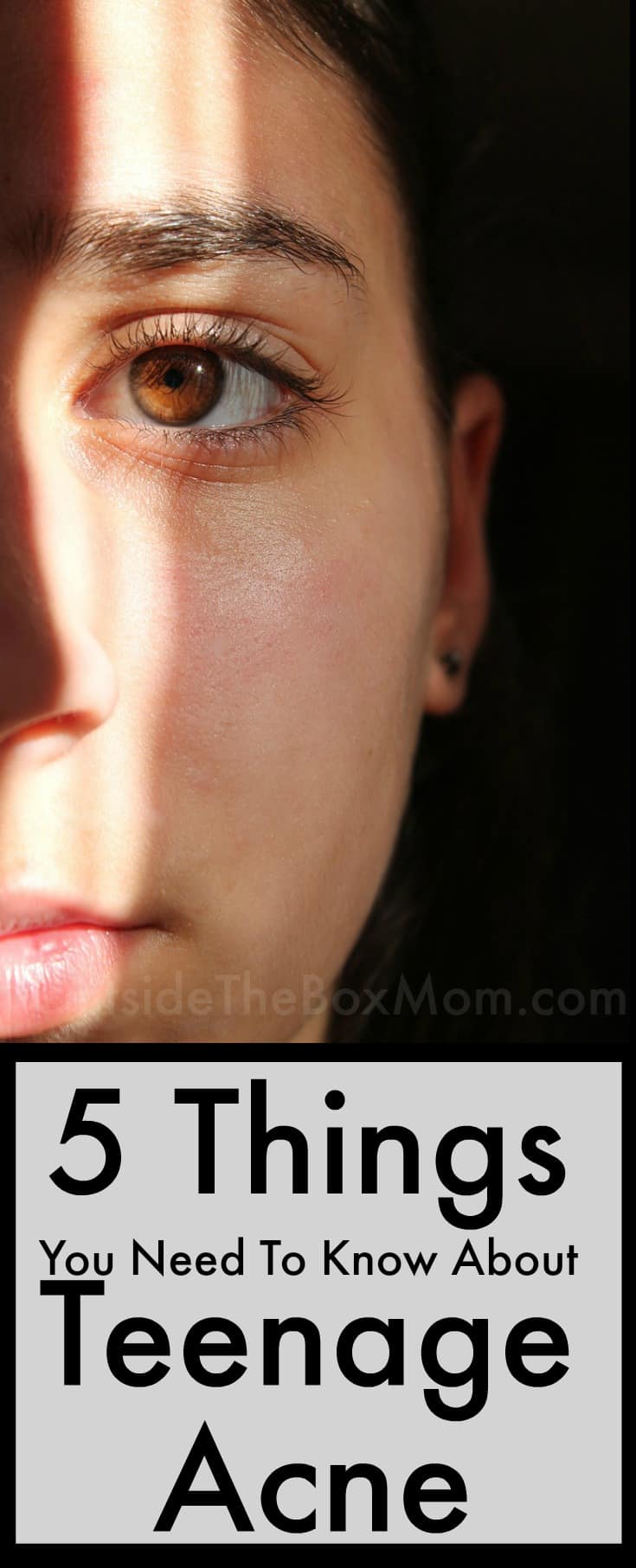Is teenage acne a problem your child is dealing with right now? Learn about the causes, symptoms, treatment, and prevention of teenage acne in this post.
 Most teenagers these days are simply too busy to deal with an acne bummer. Fortunately, you’ve landed on the right page to learn about quick and effective solutions to troublesome facial breakouts.
Most teenagers these days are simply too busy to deal with an acne bummer. Fortunately, you’ve landed on the right page to learn about quick and effective solutions to troublesome facial breakouts.
I’ve even added some prevention tips that may delay or eliminate your next acne episode.
What Causes Teenage Acne?
Before you set about treating your acne, you’ve got to know what it is and why it happens to you. First, please understand that acne is not a health risk, and you will probably outgrow it when you get through adolescence.
Blackheads, whiteheads and typical teen acne are not caused by eating chocolate or touching frogs. Acne happens when the oil glands beneath your skin produce too much of a substance called sebum. Whiteheads occur when the sebum is covered by skin. Blackheads occur when the sebum moves through the skin surface and is oxidized by air, explains WebMD.
Related: Four Things to Know About Your Teen’s Body Issues
What Are the Symptoms of Teenage Acne?
Dr. Kathy Fields is a dermatologist and the founder of the Proactiv skin products company, too. In a recent Teen Vogue magazine interview, Dr. Fields debunked the myth that summertime sun will heal acne.
In fact, the doctor noted, the sun is not your friend at all when it comes to acne cure or prevention. While direct sunlight on your skin may feel as if it’s unclogging pores and drying out oily patches, full-tilt sunshine may have a completely opposite effect on acne prone skin.
Summertime sweat can build up in pores and cause a range of skin problems, including whiteheads, blackheads, and breakouts.
Related: Reasons to Regularly See Your Doctor (Or a Dermatologist)
What Is the Treatment for Teenage Acne?
When it comes to treating teen acne, the market is booming. Before you buy, explore your skin care options and see what other people have to say about certain products. Researching the different solutions online and checking out Proactiv reviews can be quite helpful to any teen who seeks relief from troublesome, embarrassing acne.
Some teenagers find a diluted benzoyl peroxide wash to be a very effective treatment for mild acne breakouts. This can be found in gel
, lotion
or wash
forms, and you don’t need a prescription in order to use this.
Benzoyl peroxide unclogs pores while doing away with the bacteria and excess oil that cause your acne. It also helps to heal pimples.
If you’re thinking about using benzoyl peroxide, it’s a good idea to try a lotion or wash first, because the gels can be quite harsh and may make your skin even redder.
When using this treatment, the key to getting it right is to start slowly. Use a 5% lotion or wash once a day, then, after a week, you can start to use it twice a day – once in the morning and once at night – but only if your skin isn’t peeling or red.
Don’t just dab your pimples with the solution, either. Instead, you should apply a thin coat of the wash or lotion where your pimples tend to appear, avoiding the eye area completely.
If, after 4 to 6 weeks, your acne hasn’t improved, you might want to try a 10% gel or lotion. Again, use this once a day before upping this to twice a day if your skin isn’t irritated.
There are also some stronger treatments you can use, including retinoid, antibiotics, and isotretinoin
.
Retinoid is another type of gel or cream that helps to clear out your oil ducts.
Antibiotics are prescribed in gel, solution, lotion or cream form and help to reduce the inflammation caused by acne.
Isotretinoin is taken in pill form and is a strong medication, which is why you’ll need to follow your doctor’s supervision.
Whatever treatment you choose, be patient, be consistent, and never use anyone else’s medicine.
Can I Prevent Teenage Acne?
According to WebMD:
There are some steps you can take to prevent acne. To prevent oily skin that can contribute to acne, keep your skin clean. Wash your face and neck twice daily with mild soap and warm water. But never scrub your face! That can irritate your skin and worsen acne.
When Should I Call My Doctor About Teenage Acne?
Not every pimple is the same. Deep rooted zits that feel painful may actually be cystic acne. This bothersome condition typically shows up during the late teen years, just when you might think you avoided the commonest forms of acne.
Experts suggest monitoring your intake of dairy products to see if cheese and ice cream trigger a cystic acne episode. If that doesn’t do the trick, your dermatologist may prescribe a topical cortisone cream.
It’s perfectly normal for teenagers to experience occasional bouts with a pimple or three. Virtually every teen deals with acne now and then, and that’s just the way it is.
If you wash your face, use a non-oily moisturizer and still wind up with a whole lot of zits, you might want to visit a doctor who specializes in skin conditions.
I have had acne since my teenage years and have used more lotions and ointments than I would care to admit!!! I received Adult acne serum of dermalmd brand as a gift and it has been life-changing. It truly works. If you’re someone who has been struggling with their skin and can’t seem to find the right regimen, Dermalmd is for you!